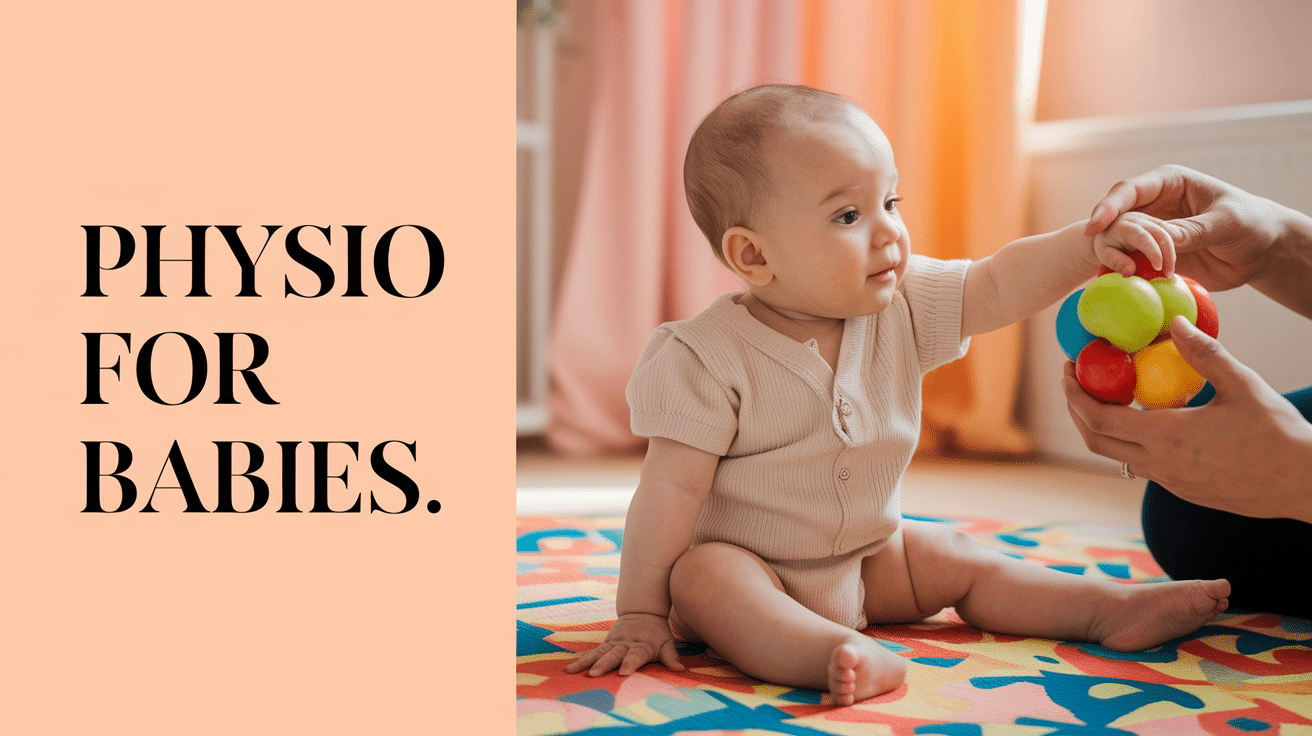
Watching your baby reach new milestones is one of the most exciting parts of being a parent. From those first smiles to rolling over, sitting up, and eventually walking, each step shows amazing growth.
But did you know you can also help your little one develop these skills? Baby physiotherapy offers ways to support your child’s physical development.
Experts share that gentle exercises and specific movements can help babies grow stronger and reach milestones with confidence.
You will learn everything you need to know about baby physiotherapy – what it is, when to start, and how it helps your precious little one develop healthy movement patterns that will benefit them for years to come.
Remember, you are your baby’s expert, and you are the only one who can make them an expert, too!
What Is Baby Physiotherapy?
Baby physical therapy, or physio, mainly called pediatric physiotherapy, helps babies develop movement skills and strength. It uses gentle exercises and activities designed just for babies.
Most babies start regular development checkups right after birth. However, specific physiotherapy sessions usually begin when needed, often around 3-6 months if a baby shows signs of needing extra help with movement.
The American Academy of Pediatrics (AAP) recommends watching babies’ development closely during regular checkups.
They suggest that parents talk to doctors about any movement concerns as early as possible.
Early attention helps babies get support when it matters most. Physical therapists who work with babies have special training to make exercises fun and safe.
Importance of Physiotherapy for Baby
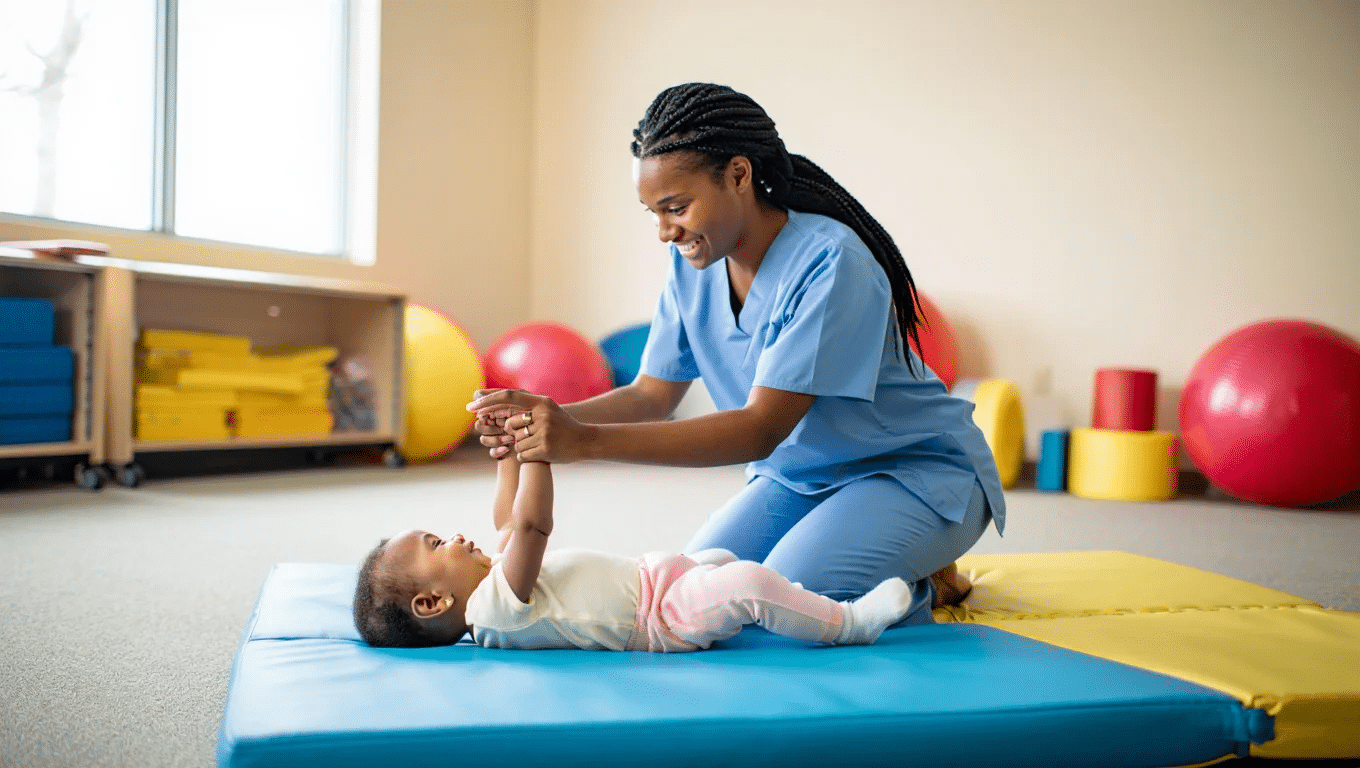
Physiotherapy plays a key role in supporting healthy development for babies who might need extra help with movement skills. This specialized care can make a big difference in a child’s early life growth.
Important reasons to consider baby physiotherapy include:
- Helps babies reach movement milestones at the right time
- Prevents potential movement problems from getting worse
- Builds strength in babies’ muscles for better control
- Teaches parents helpful exercises to do at home
- Creates a foundation for good posture and movement habits
Benefits of Physiotherapy for Babies
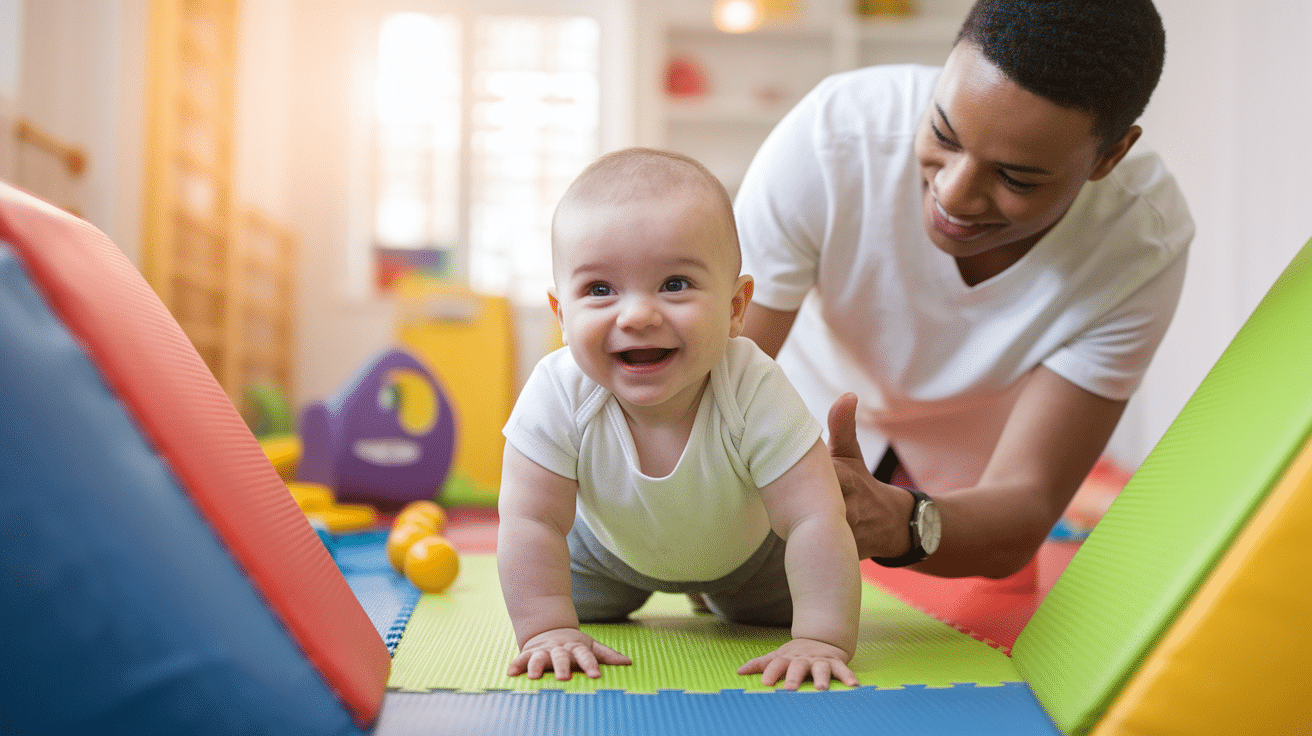
When babies receive proper physiotherapy support, they gain many advantages that help them thrive physically and developmentally.
Key benefits of baby physiotherapy include:
- Improves balance and coordination skills
- Boosts confidence as babies master new movements
- Increases body awareness and sensory development
- Supports brain development through movement activities
- Reduces frustration by helping babies move more easily
Starting physiotherapy early when needed gives babies the best chance to develop strong, healthy movement patterns that will support them throughout childhood and beyond.
Exercises and Tasks for Infant Physical Therapy

Physical therapy exercises help babies develop strong muscles and good movement skills. These simple activities support healthy growth and can prevent future problems.
Try these exercises with your baby under the guidance of a healthcare professional.
1. Tummy Time
Tummy time helps babies strengthen their neck, shoulder, and back muscles. Place your baby on their tummy on a flat, firm surface for 3-5 minutes several times a day.
Start with short sessions and gradually increase the time as your baby gets stronger. Always watch your baby during tummy time.
2. Assisted Sitting
Support your baby in a sitting position by holding them at the hips or trunk. This helps develop core strength and balance. As they get stronger, provide less support, allowing them to work their muscles more.
Make it fun by placing toys within reach.
3. Reaching Activities
Place colorful toys slightly out of reach during tummy time or sitting to encourage your baby to stretch and grab. This helps develop arm strength, coordination, and trunk control.
Change the position of toys to encourage movement in different directions.
4. Gentle Stretching
Simple stretches can help babies with tight muscles. Gently move your baby’s legs in a bicycle motion or stretch their arms out to the sides and then across the chest.
Always use slow, gentle movements, and stop if your baby seems uncomfortable.
5. Rolling Practice
Help your baby learn to roll by gently guiding their hips and shoulders. Place toys on one side to encourage them to roll toward the toy.
This helps develop coordination and gives babies a way to move independently.
Key Developmental Milestones in the First Year
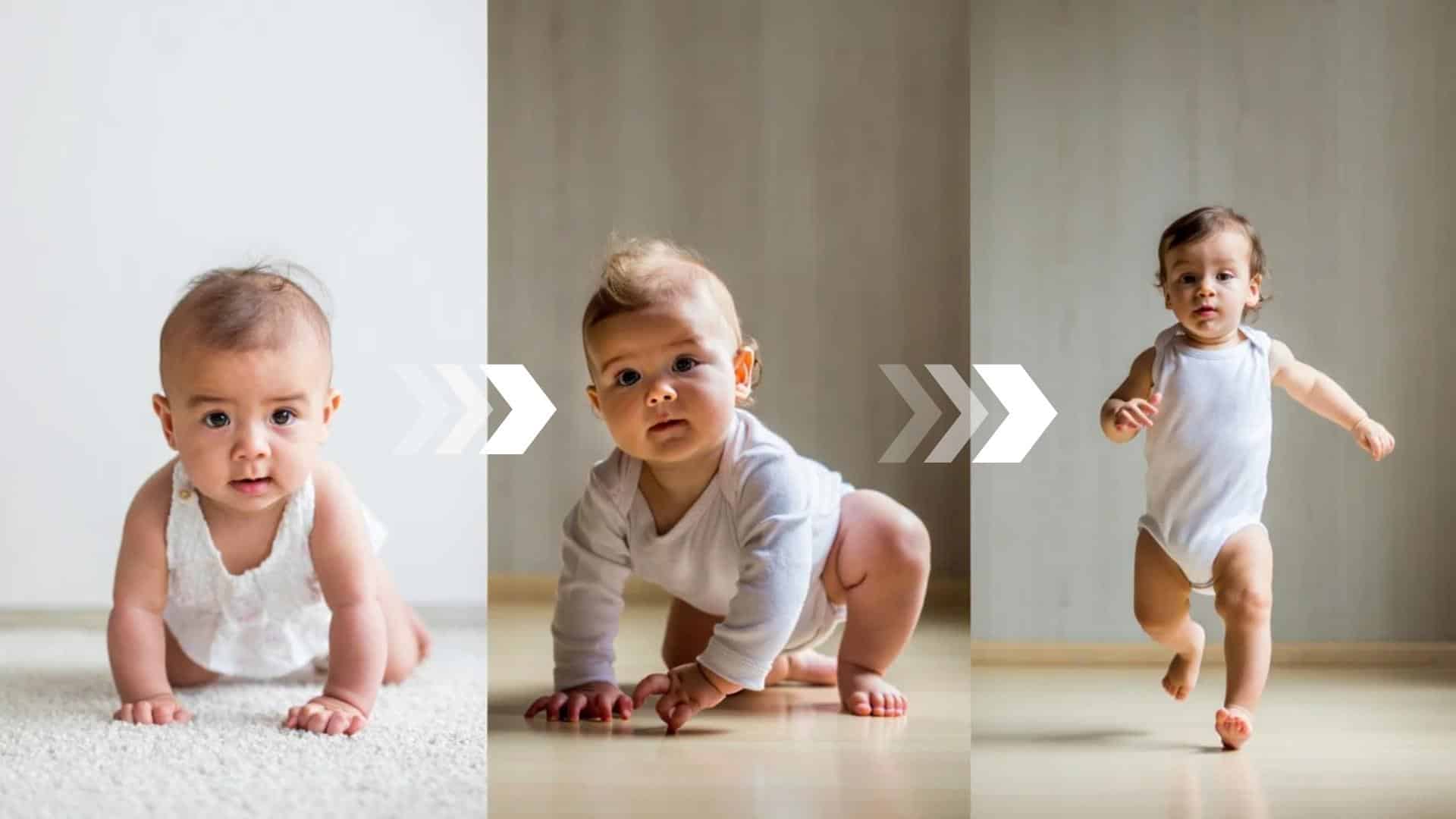
During their first year, babies grow and learn new skills quickly. Knowing these milestones helps parents understand whether their baby is developing normally or might need extra help.
| AGE RANGE | DEVELOPMENTAL MILESTONES |
|---|---|
| 0–3 months | Lifts head during tummy time, follows objects with eyes, starts to smile |
| 3–6 months | Rolls from tummy to back, reaches for toys, sits with support |
| 6–9 months | Sits without support, begins crawling, transfers objects between hands |
| 9–12 months | Pulls to stand, cruises along furniture, may take first steps |
| 12+ months | Walks independently, climbs on furniture, squats to pick up toys |
How Do I Know if My Baby Needs Physical Therapy?
Sometimes, babies need extra help to develop movement skills. Watch for these signs that might show your baby could benefit from physical therapy.
- Shows a strong preference for turning the head to only one side
- Has very stiff or very floppy muscles compared to other babies
- Doesn’t meet movement milestones like rolling, sitting, or crawling
- Uses only one side of the body for reaching or moving
- Has an unusual crawling style or skips crawling altogether
- Shows delays in more than one developmental area
When to Consult a Pediatric Physiotherapist?
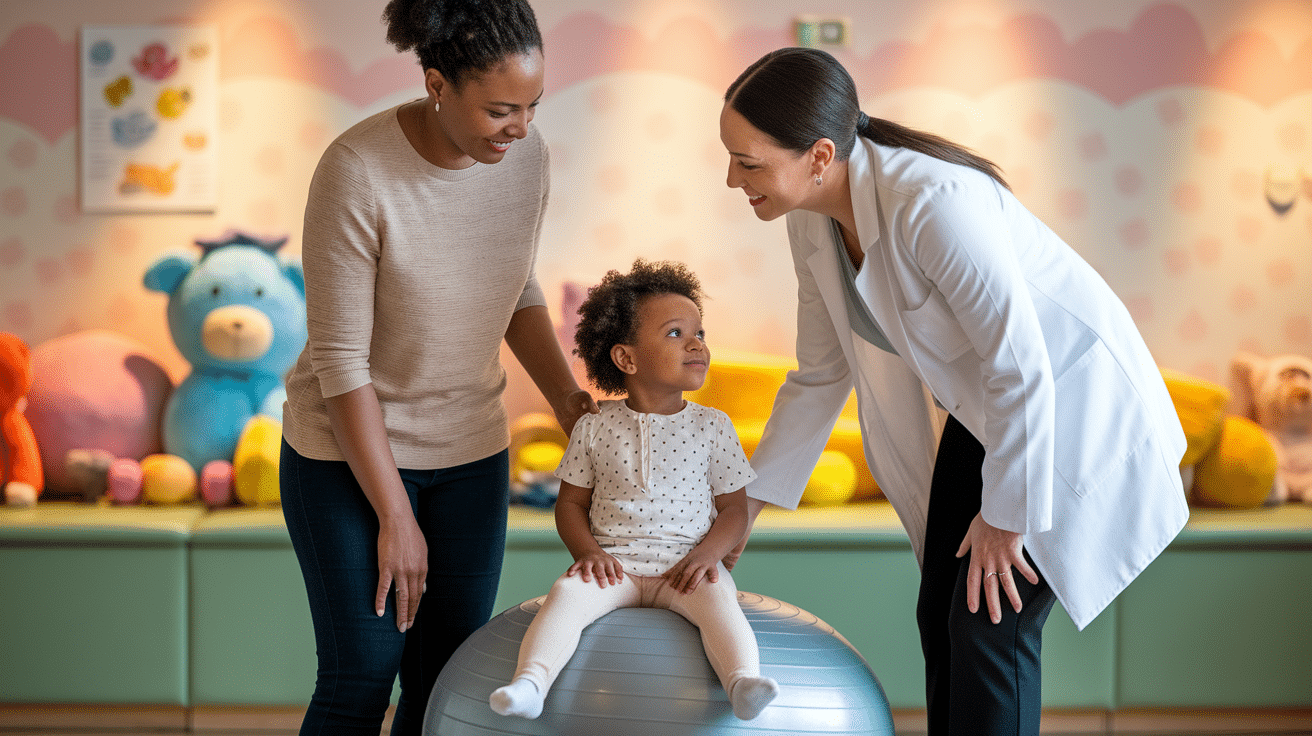
Knowing the right time to get help from a pediatric physiotherapist can make a big difference in your baby’s development. Early help often leads to better results.
A physiotherapist who specializes in baby care can check your baby’s movement patterns and suggest exercises or treatments.
Signs You Need to Consult a Physiotherapist
- Your baby shows a delay in reaching movement milestones like rolling, sitting, or crawling.
- You notice your baby has unusual movement patterns or muscle tone.
- Your doctor has concerns about your baby’s physical development.
Babies with conditions like Down syndrome, cerebral palsy, or muscle disorders should see a physiotherapist as part of their care plan.
Even without these conditions, any baby showing movement delays can benefit from an evaluation.
The Bottom Line
Baby physical therapy helps little ones develop strong bodies and good movement skills. The exercises are simple and can easily become part of daily playtime.
Parents play a big role by noticing developmental concerns early and seeking help when needed.
Remember that all babies develop at their own pace, but it is always best to get help for concerns early. A pediatric physiotherapist can provide guidance specific to your baby’s needs.
With the right support, most babies can overcome movement challenges and develop the skills they need for an active, healthy life.
Working together with healthcare providers gives your baby the best chance for healthy development. Don’t hesitate to ask questions or seek help if you have concerns about your baby’s growth.
If you’re interested in more informational content on mothers and babies, feel free to click here and explore other blogs that you might enjoy.
